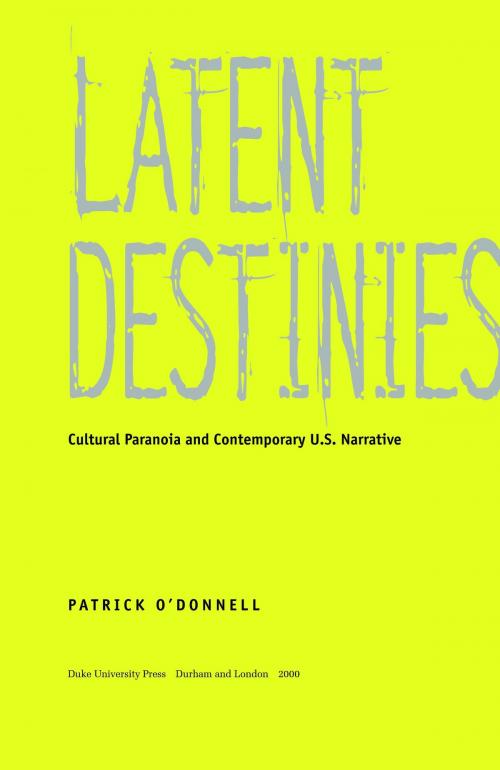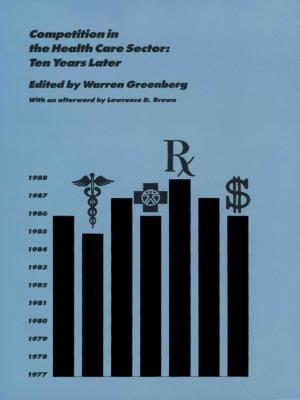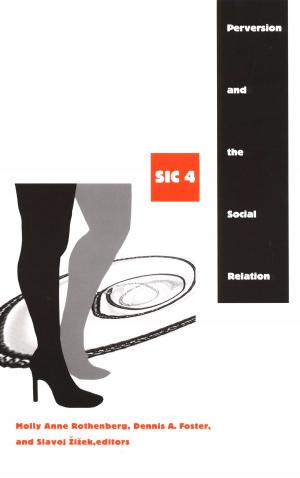Latent Destinies
Cultural Paranoia and Contemporary U.S. Narrative
Fiction & Literature, Literary Theory & Criticism, American, Nonfiction, Entertainment, Film, History & Criticism, Performing Arts| Author: | Patrick O'Donnell, Donald E. Pease | ISBN: | 9780822380641 |
| Publisher: | Duke University Press | Publication: | October 27, 2000 |
| Imprint: | Duke University Press Books | Language: | English |
| Author: | Patrick O'Donnell, Donald E. Pease |
| ISBN: | 9780822380641 |
| Publisher: | Duke University Press |
| Publication: | October 27, 2000 |
| Imprint: | Duke University Press Books |
| Language: | English |
Latent Destinies examines the formation of postmodern sensibilities and their relationship to varieties of paranoia that have been seen as widespread in this century. Despite the fact that the Cold War has ended and the threat of nuclear annihilation has been dramatically lessened by most estimates, the paranoia that has characterized the period has not gone away. Indeed, it is as if—as O’Donnell suggests—this paranoia has been internalized, scattered, and reiterated at a multitude of sites: Oklahoma City, Waco, Ruby Ridge, Bosnia, the White House, the United Nations, and numerous other places.
O’Donnell argues that paranoia on the broadly cultural level is essentially a narrative process in which history and postmodern identity are negotiated simultaneously. The result is an erasure of historical temporality—the past and future become the all-consuming, self-aware present. To explain and exemplify this, O’Donnell looks at such books and films as Libra, JFK, The Crying of Lot 49, The Truman Show, Reservoir Dogs, Empire of the Senseless, Oswald’s Tale, The Executioner’s Song, Underworld, The Killer Inside Me, and Groundhog Day. Organized around the topics of nationalism, gender, criminality, and construction of history, Latent Destinies establishes cultural paranoia as consonant with our contradictory need for multiplicity and certainty, for openness and secrecy, and for mobility and historical stability.
Demonstrating how imaginative works of novels and films can be used to understand the postmodern historical condition, this book will interest students and scholars of American literature and cultural studies, postmodern theory, and film studies.
Latent Destinies examines the formation of postmodern sensibilities and their relationship to varieties of paranoia that have been seen as widespread in this century. Despite the fact that the Cold War has ended and the threat of nuclear annihilation has been dramatically lessened by most estimates, the paranoia that has characterized the period has not gone away. Indeed, it is as if—as O’Donnell suggests—this paranoia has been internalized, scattered, and reiterated at a multitude of sites: Oklahoma City, Waco, Ruby Ridge, Bosnia, the White House, the United Nations, and numerous other places.
O’Donnell argues that paranoia on the broadly cultural level is essentially a narrative process in which history and postmodern identity are negotiated simultaneously. The result is an erasure of historical temporality—the past and future become the all-consuming, self-aware present. To explain and exemplify this, O’Donnell looks at such books and films as Libra, JFK, The Crying of Lot 49, The Truman Show, Reservoir Dogs, Empire of the Senseless, Oswald’s Tale, The Executioner’s Song, Underworld, The Killer Inside Me, and Groundhog Day. Organized around the topics of nationalism, gender, criminality, and construction of history, Latent Destinies establishes cultural paranoia as consonant with our contradictory need for multiplicity and certainty, for openness and secrecy, and for mobility and historical stability.
Demonstrating how imaginative works of novels and films can be used to understand the postmodern historical condition, this book will interest students and scholars of American literature and cultural studies, postmodern theory, and film studies.















